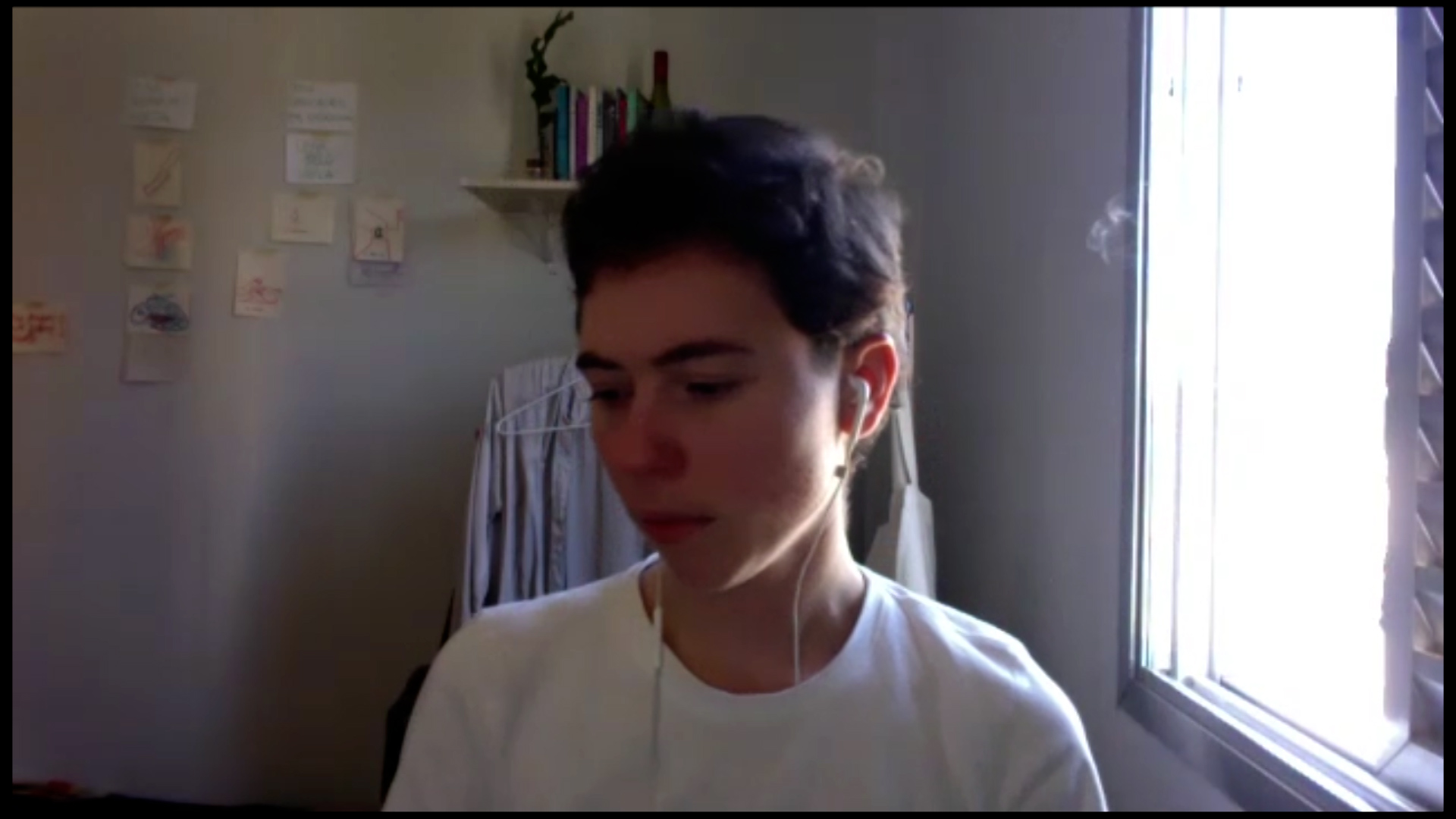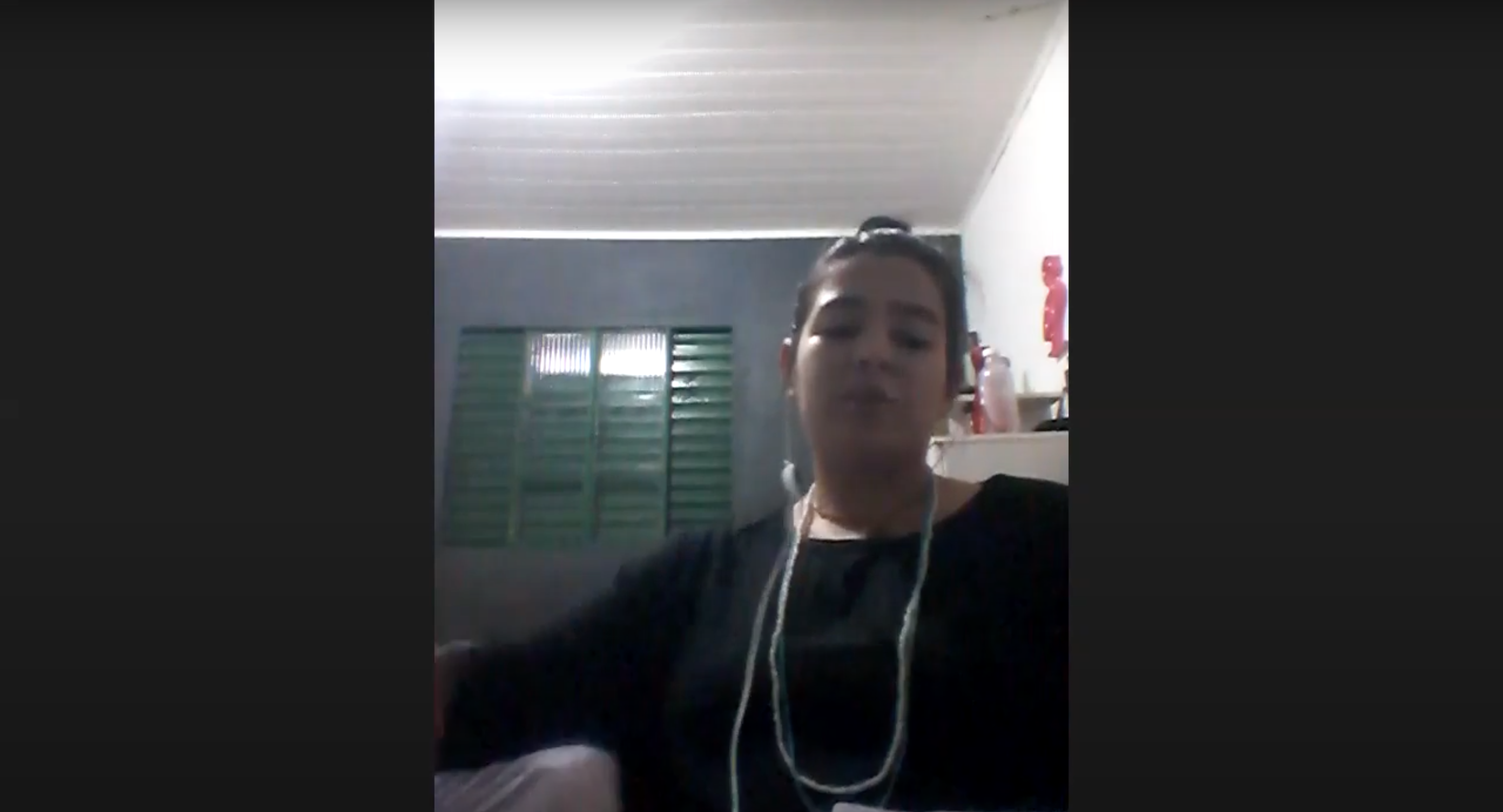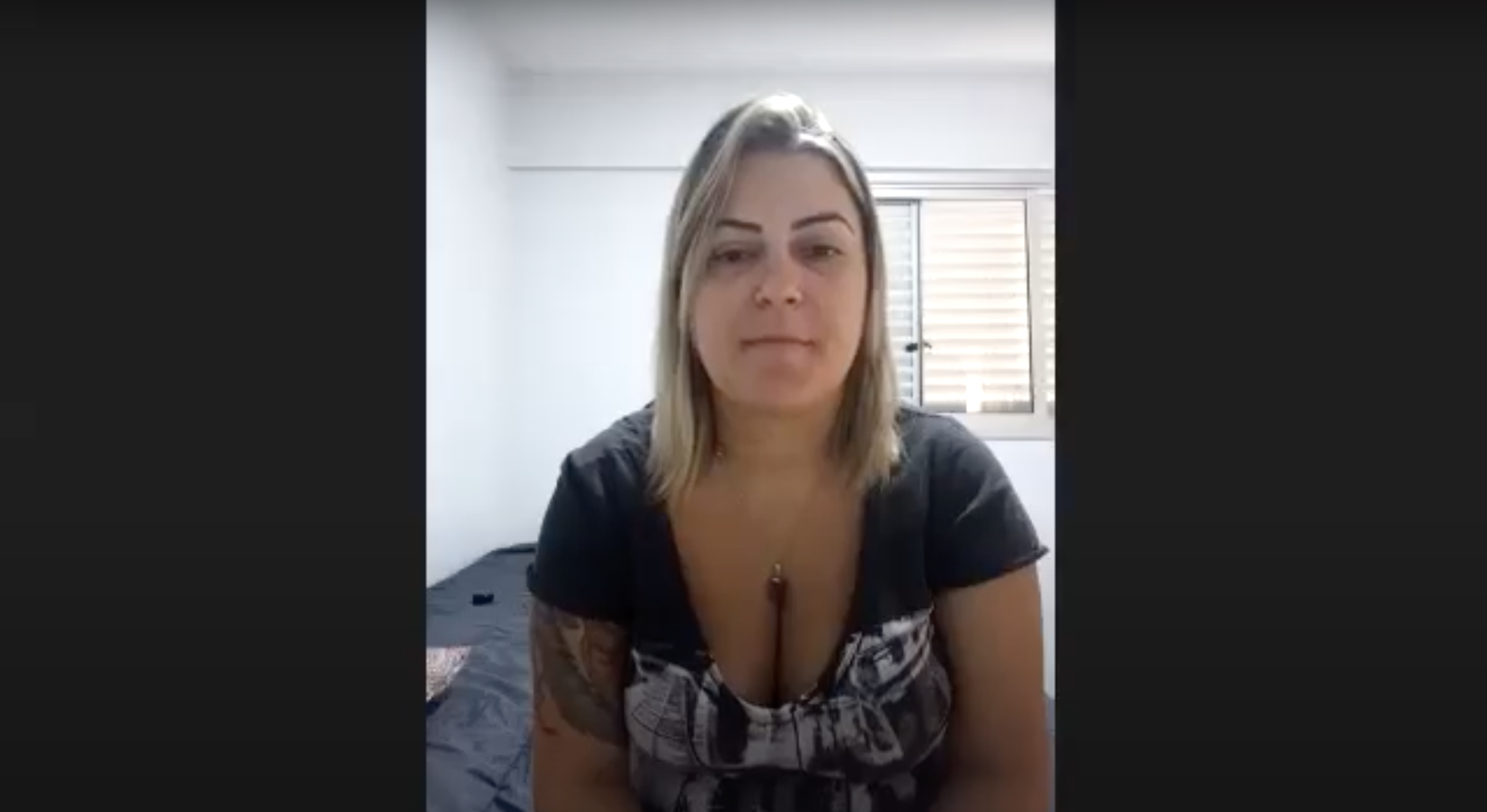Camila Svenson
PROJECT INFO
"Invitation to Talk" is an action funded by CO-RESIDENCY , an international online residency program which support artists during the Pandemic period.
During a 12-week period Camila Svenson invited lesbian, dykes and queer women to chat with her by video call. All conversations were recorded.
This piece investigates the multiplicity of narratives and performativity that can be established in a virtual space. It also seeks to create spaces for listening and speaking inside the LGBTQI+ community in Brazil.
BRAZIL | VISUAL ARTIST
Camila Svenson is a Brazilian visual artist based in Sao Paulo, Brazil, working with photography, video, collections and objects. In her work she is constantly looking at love, affection and fiction. Camila Svenson's pieces often involve participative methods and she is interested in observing how encounters happen, and how the performativity of an encounter changes when mediated by a camera; questioning the fragility of the image as a document of proof and how the concept of fiction can be articulated inside visual narratives.
During these 12 weeks at CO-RESIDENCY I’ve learned to handle the frustration of being within the virtual environment, by not pretending that the virtual world could be like a conversation in a bar on a sunny day. Instead, understanding that the work took place as an action that only existed in a certain time and space.
C:
what is time for you?
M:
what is time
the time in general, or the time between us?
C:
the time. What do you think about that word.
M:
I would go to the social, philosophical side ... but I think it is a very rationalized answer. I don't know if I took the rational, took the ideal, it's an illusion, it's relative ... it's natural, I think. it's natural.
I'm in love with Fernando Pessoa, and he brings a lot of that to me; if I die today and spring comes, great. I'm happy, because life will go on. and everything else will come, summer ... and life goes on, whether I die or not.
this is the time. It remains independent of ridiculous, human issues, It makes us take this center, this anthropocentrism of people, who thinks we are the center of the world, and does not realize that a coronavirus is coming soon.
I think that's it.
C:
do you think a lot about death?
What is it?
where are we going? what happens?



C:
What do you think is going to happen to the world now? What do you think about what's going on, where does it go.
M:
it's very contextual, right. Particularly, the first thing I’m going to do when It finish .. I need to spend the night with my friends, talking bullshit, drinking a beer .. it’s something that it is sorely missed. and I have the feeling I'm going to fuck the world, you know? I'm going to do whatever I feel like because I've been stuck all these days, and now I'm going to dive into it.
I can send you two texts that I did now… everyone is asking, the notices are asking what are you going to do, when the quarantine passes?
but this is my context, in the general context I think the mask will remain, people will be more annoyed about it. but at the same time I think; this was a trend in China, don't touch me ... europe, only the latin countries are much more hot, so how are we going to deal with it, i still don't really see it. I get this feeling of okay, we’re going to have a sanitization now, blase .. but willn’t it be just elitism? what the people will be like… so I am in doubt if something is really going to change, or if we just go with a thirst for life and fuck the world… I don't know…
C:
and how can we teach bodies to keep their distance, since it is not something that is organic in the body, you know? I think the body seeks the encounter. how can we teach this. in a week, a day



C:
do you think that people's last day happens something different?
I:
I don't think it's the last day of someone's life that is extraordinary. I think it’s just a day, and then you accidentally die. Especially this accidental death of youth. I don't know, there are some very bizarre stories like that. last year a boy from geography died. he was doing a computer internship at the station, and the teacher asked him to move a cabinet. and then he and a friend moved the closet, they went to take the elevator, and the elevator he didn't have all closed sides. it had a glass door and it had a half open part. then they supported the cabinet and only the boy entered the elevator, the other boy did not enter because he didn’t fit. he just pushed the button to go up.. and then he died. Transporting a cabinet
C:
very banal right? die like that.



C:
what is tragic?
S:
so, the tragedy .. wow, there is a text that my mother sent me these days until, differentiating the drama from the tragedy. I will try to remember exactly how she put it ...
but the drama has a lot more to do with internal issues, skating inside, and the tragedy is more connected to the world as a whole.
oh my god, want to open her text actually.
C:
can open if you want
S:
I found these days ...
C:
tragedy for me gives me a feeling of something more withering. a tragic fate, I don't know .. it comes to mind.
S:
even a pre-established thing ..
C:
yes, I don't know, I think of the tragedy in this more collective place as well. a great world tragedy.
W:
I found the text... it says that Brazilian theater is no longer composed of imitations and imitators. since the beginning of the last century, the practice of theater has brought material reality closer. this at first sight implies two major changes in the lives of art professionals: the first is that there is no rule of a manual to be followed, that to live according to the artistic discourse itself, and the second is that this approach is born out of a new theatrical genre, which is neither comedy nor drama, which is neither superior nor inferior.
oh, this is the thing, that the drama also works on having people who are better or worse. well, the tragedy is very little performed, but it still appears in another piece that appears here or there.
the genre does not place man as superior or inferior at the same time, as a complex, proper and unique universe. and very diverse. that allows for error and mediocrity, living with virtuosity and right ..
I think that's it, to think that in the tragedy there is the presence of even the gods, who are petty and whoever is in the game, nobody is perfect in the game, doesn't have one…
let's see what else she says ...
C:
what do you mean by fiction?



C:
how do you do to not suffer?
S:
I dont know too. I have no idea.
C:
I feel that relating in the quarantine is very complex, because it seems that there is also a limited space for things. I feel that relationships have this place of meeting, but there is this place where you go out into the world and come back with news, you know? she comes back bringing experiences, and then each person goes to a place and you meet, and you do things, and then the relationship is in a very wide place. then I keep thinking about this place in the quarantine, that the body cannot come and go.
S:
we don't live anything new ..
and not only that, but also directly in the most intimate situation, which is the routine of the house. you are not going to meet at a bar. the second date, the first date is to go to the person's house. the first meeting is to cook lunch, soak the beans, some things that are also completely out of everything I’ve ever experienced as well, in relation. already looking very closely at the person. and that’s it, half marasmus, and half too intimate.
I think maybe what is new is to go deeper and deeper into the other person. maybe it's kind of that new feeling that I keep feeling, every time I managed to get a little deeper, to know some things I didn't know before. but yes, the world is missing, this whole thing is missing .. life is missing, right? now. we're just waiting it seems.
C:
Its a great affection in a waiting place. it's really crazy. it's really crazy.
S:
are you in love now?



M:
how are you, are you good?
C:
it's very exhausting. it was supposed to be a project on love. I wanted people to talk to me about breakup stories, and relationships. but there is no point in wanting things, because each person says something. I want it to be a project on something means nothing.
M:
but look how funny, you told me it was about love.
C:
why funny?
M:
because they are supposed to be contrary things. but we know they are not. but there is a difference between love and breakup
C
what's the difference?
M
the interruption .. is that there are very different types of termination. what do you expect to hear?
C:
i don't know .. i have no idea.
M:
stories ..
C:
I don't know, in reality I think I just expected to talk to people and then at the beginning I was super narrow, trying to understand how I make the video quality to be good, for the audio to be good, then I need to photograph people , being ... I do a facetime .. what the fuck ...
and then it's useless, because I'm not there. is like having a party online. this ‘let's pretend everything is normal’ behavior and this virtual barrier, it’s just a transparent barrier, but we can continue to behave the same way ..
M:
I think this is crazy. I can't imagine putting a camera on and pretending I'm at a party. and people are doing it right? I am amazed. and I’m a little disgusted that we use the same names .. ‘we’re going to make a bar’ and I’m ‘people, you can’t call it a bar’ you know? this is the opposite of the bar. we can see each other, try to talk and listen, but the bar is not…
Photography is the language in which I express myself for almost ten years. I rely on images and on the operation of photographing because it is a language I have control over. I know how to make images, and I know how to make images look the way I want them to look. With the beginning of the quarantine, I observed how the world adapted. An imposed and imposing adaptation. From one day to the next I taught my body how to disappear.
I taught my body not to touch, to back off, to keep my hands away from my face, eyes, mouth. An apparently absurd path for those who live in a place where strangers are greeted with one kiss on the cheek (depending on your city, sometimes it can be two). Aren't all paths absurd? Considering Brazil, a country which ignores its dead and governs in a logic of necropolitics, is already operating in an absurd logic. The way we adapt our bodies to fit this reality is only a minor factor.
In this sudden adaptation, virtuality is inserted in all possible spaces, like a veil. We try to pretend it is invisible, transparent, almost unnoticeable. We add virtuality to our bodies while pretending that it doesn't hurt that much. I was invited to virtual bar meet-ups and parties. The body needs to perform the nostalgia of the near past in order to make itself recognizable in the universe. The same happened with the image. How can an image be produced without the encounter taking place?
And after all, what is the act of photographing about? If an image is produced, does it matter if the meeting took place? I observed some people photographing from a distance. Now people photograph each other through two cameras connected by the internet, a mysterious network of millions of meters of cables that are buried in the ocean. Sometimes these cables have to be replaced, because the fish can eat their material. It’s the ‘new normal’ I’ve heard. I wonder if this image and the possibility of its existence can be considered as what I understand by photography.
For the residency program, I decided to work with operations and processes that are repeated a lot in my work: listening, the experience of being sapatão, and the encounter. At first, my desire was to talk to sapatões and lesbian women about relationships, affection, breakups. I don't understand why, but I know that there is a genuine interest in my process as an artist that permeates this place.
It is also important to understand the plurality of bodies and experiences that can inhabit the word sapatão. I am interested in approaching this conversation, understanding the sapatão experience as an identity and political experience, which goes far beyond having or not a relationship with a woman. Here, I decide not to translate the word sapatão into English, because I understand that the translation is not enough. A term that would come close, but is still insufficient, may be 'dyke', but it is important to note that both words say a lot about the specific socio-political context of a country, a language and a specific culture.
I tried to apply the operation of photography to this work, but I understood that this project exists within the action of a conversation in virtual space, and not in the action of illustrating these encounters through a final photograph (for example, the portrait of each person that participated). It was very confusing and challenging for me to give up the image and put my body into action (even in its virtuality, it takes a lot of energy for one to engage in a conversation).
The conversations did not follow a pre-established protocol and I also did not have a list of possible questions. I cannot have control over what comes out of someone’s mouth - which is something obvious, but coming from someone who has much control over images, it was a real challenge. At one point, I just stopped trying to make a project about people’s breakups and started doing a project about talking. Dialogues and narratives have taken very different paths. We talked about fiction, carnival and the fear of dying. We also talked about love and the power of beginnings. In all, 20 people talked to me over the course of two months.
I’ve transcribed all these conversations because I want to get as close as possible to everything that has been said. With the transcriptions, I started to translate all conversations into English, understanding that when we translate something into another language, a world is lost and adapted, and that's fine. I find it interesting in this final stage of the project, having to translate this work for people who don't speak portuguese, to understand that the translation will never be enough. Just as virtuality is not enough, just as an internet conversation will not be the same as a physical encounter. Over these three months I’ve learned to handle frustration by putting my body in action within the virtual environment, not pretending that virtuality could be like a conversation in a bar on a sunny day, while understanding that the work took place as an action that only existed in a certain time and space. I also put here prints of these conversations, and transcripts that I think are meaningful. This material is also a translation and has the potential to lose its significance along the way.